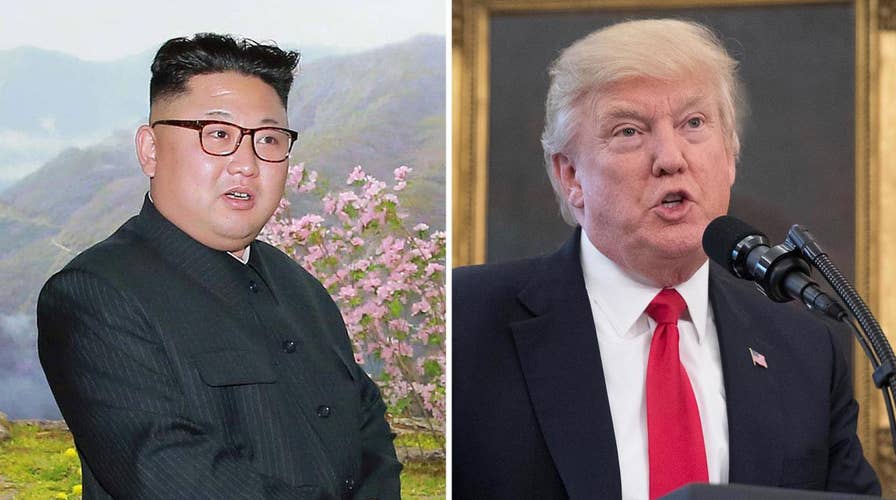President Trump aims to take on North Korea with China
The administration is demanding China pressure North Korea to abandon their weapons programs; Rich Edson has the story for 'Special Report'
North Korea fired a ballistic missile into the Sea of Japan Wednesday, U.S. and South Korean officials said, amid worries that the North might soon conduct banned nuclear or long-range rocket tests.
The U.S. Pacific Command said it detected and tracked what it assessed as North Korean missile launched from land near the eastern coastal city of Sinpo. A U.S. statement said initial assessments indicate the type of missile was a KN-15 medium-range ballistic missile. South Korea's Joint Chiefs of Staff said the missile flew about 37 miles.
The launch came hours after U.S. President Donald Trump described North Korea's pursuit of a nuclear arsenal as a "humanity problem" and a senior U.S. official told reporters that the "clock has now run out" on Pyongyang.
A White House official also said Tuesday that "all options are on the table" for the U.S., though the official would not say what steps Trump was willing to take to curb dictator Kim Jong Un's pursuit of a nuclear weapon.
In a statement, Secretary of State Rex Tillerson said North Korea had launched "yet another intermediate range ballistic missile. The United States has spoken enough about North Korea. We have no further comment."
The KN-15 missile reportedly refers to what North Korea calls the solid-fuel "Pukguksong-2." The use of solid-fuel missiles is a worrying development because the fuel already being inside the rocket shortens launch preparation times and make it harder for outsiders to detect what's happening before liftoff.
When North Korea test-fired this missile in February, South Korean officials said it flew about 310 miles before landing in international waters. It wasn't immediately known if the much shorter distance of Wednesday's flight meant a failed launch.
Recent outside satellite imagery show possible preparations for a new nuclear test at the North's main nuclear test site, such as communication cables used to initiate a test and collect data being already laid. North Korea's state media has also said the world will soon witness what it calls "eventful successes" the country achieves in the space development. Washington, Seoul and others call the North's space program a cover for its long-range missile development program.
Japan's Chief Cabinet Secretary Yoshihide Suga said the country lodged a strong protest over the launch.
Wednesday's firing was made as South Korean and U.S. troops were conducting annual military drills that the North views as an invasion rehearsal. North Korea often responds to the drills with its own military training and harsh rhetoric. The allies say the drills set to run until the end of this month are defensive in nature.
Two weeks ago, the South Korean and U.S. militaries said they had detected a failed North Korean ballistic missile launch. South Korean media speculated at the time that North Korea might have attempted to test a missile that it hasn't deployed. Earlier in March, North Korea fired four ballistic missiles that flew about 620 miles, with three of them landing in waters that Japan claims as its exclusive economic zone.
North Korea is pushing hard to upgrade its weapons systems to cope with what it calls U.S. hostility. Many weapons experts say the North could have a functioning nuclear-tipped missile capable of reaching the continental U.S. within a few years. North Korea carried out two nuclear tests last year.
Trump and Chinese President Xi Jinping will huddle Thursday and Friday at Trump's Mar-a-Lago estate in Florida, a venue chosen to give the summit a more informal feel. White House officials said Tuesday that trade and security would be high on the new American president's agenda, including pushing China to exert more economic pressure on North Korea.
China continues to oppose the tough measures demanded of it to address the issue, fearing a collapse of the Pyongyang regime would bring a crush of refugees and possibly U.S. and South Korean troops on its border.
Trump told the Financial Times over the weekend that the U.S. is prepared to act alone if China does not take a tougher stand against North Korea's nuclear program.
"China has great influence over North Korea," Trump said. "And China will either decide to help us with North Korea, or they won't. And if they do that will be very good for China, and if they don't it won't be good for anyone."
Fox News' Lucas Tomlinson and The Associated Press contributed to this report.

